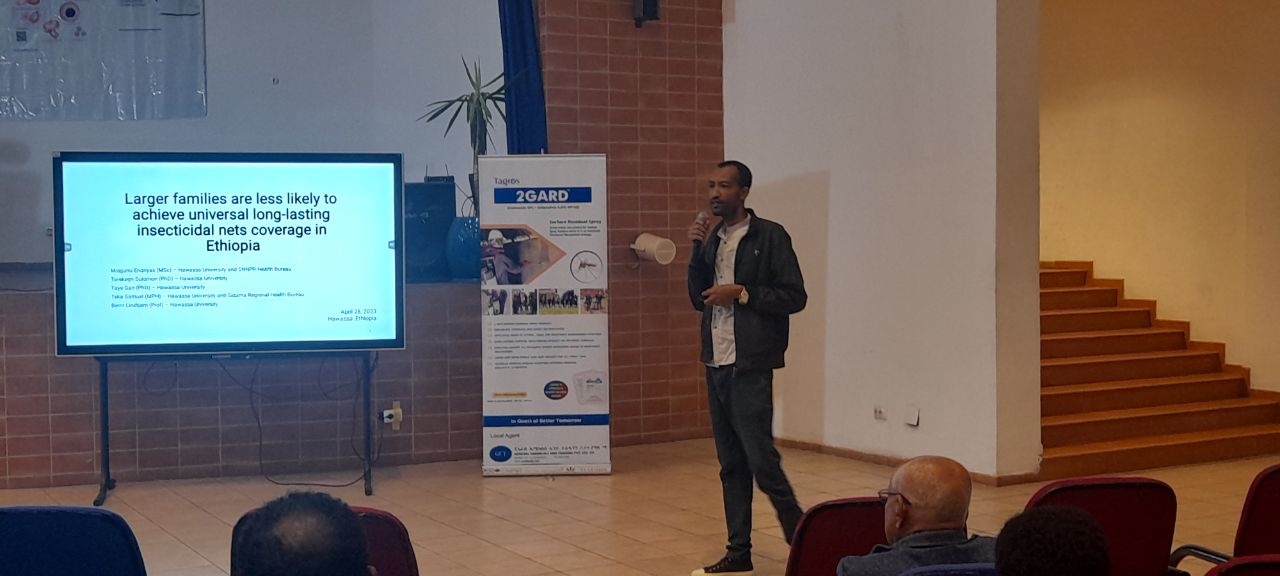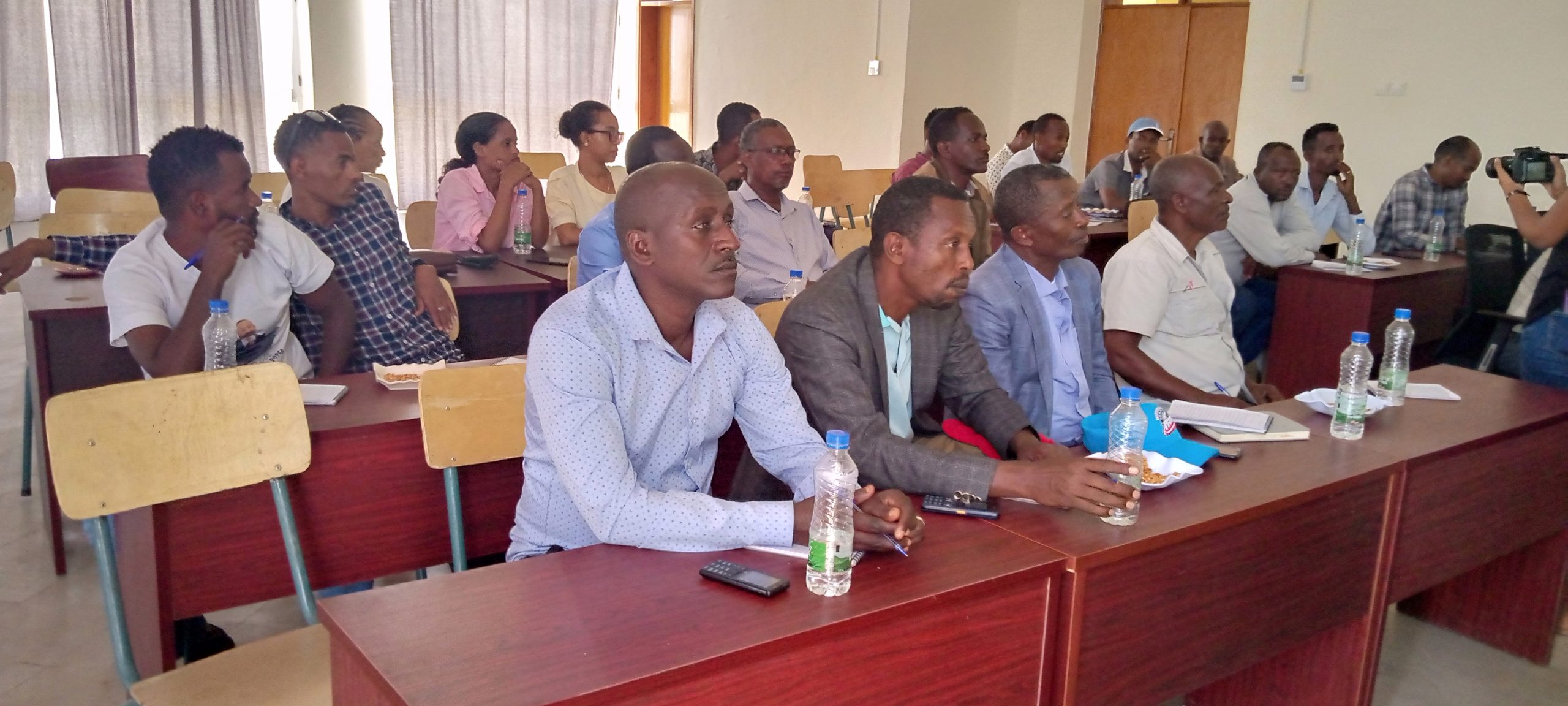We have now updated the publication list of Senuph. Please see:
Author Archives: Bernt Lindtjørn
Malaria prevention trial in Arba Minch has been registered
Malaria and other vector-borne diseases most affect low-income people living in poorly constructed houses and poorly managed environments. A recent review on housing and vector-borne diseases indicates that housing improvement protects people against malaria and dengue infection. Our previous studies on housing intervention reduced the indoor density of vectors and malaria incidence. Interestingly, improved housing protects everybody inside the house, can easily be integrated with existing interventions, reduces exposure to pollutants, and can improve indoor ventilation. To this end, the housing intervention we consider the pushing factor (diverting mosquitoes away from where people live) is supplemented by interventions that attract mosquitoes (pulling factors). Ivermectin is widely used to control endo- and ectoparasites of animals and treatment of filarial nematode parasites of humans. Several studies have also shown the efficacy of ivermectin against malaria vectors.
Although there is evidence of the cost-effectiveness of house screening intervention against malaria, combining house screening with Ivermectin cattle care still needs to be determined. We hypothesise that these novel push-pull malaria control interventions can make a measurable change in malaria incidence, the indoor and outdoor density of malaria vectors, and human exposure, reducing household poverty due to less sickness.
The primary objective of this trial is to determine whether house screening and ivermectin administration to households with cattle reduce malaria incidence among all age groups compared to the groups using conventional malaria control tools. The primary outcome variable of the study will be the incidence of malaria among all age groups in intervention groups compared with the control arm. Epidemiologic and serologic endpoints will be measured by screening study participants every four months for two consecutive years.
Furthermore, a bimonthly entomological assessment will be done in each arm for two years. We shall also measure human exposure to mosquito bites and malaria parasites by assessing serological markers and the entomological indices of malaria. The interventions’ durability, community acceptance, and cost-effectiveness will be considered. Multidimensional household poverty reduction due to malaria intervention will be evaluated.
Registration for the trial is at The Pan African Clinical Trials Registry (PACTR) with registration number PACTR202306667462566
Malaria Day Conference in Hawassa
Misganu Endrias presented some preliminary findings from our malaria research in Sidama at the Ethiopian meeting on Malaria Day in Hawassa. 
His presentation can be read here: Ownership of LLITNs 28.4.23
Preprints
We have now started to tell you about preprints originating from our research. These articles have not yet been peer-reviewed but contain important information that researchers in our project are doing.
After they have been disseminated in a Journal, they will be included in our publication list.
Sidama malaria surveillance project
The work aims to improve malaria surveillance and thus help health authorities reduce malaria. The study will enhance locally relevant evidence-based initiatives and inform Ethiopia’s malaria prevention and control efforts.
The local Ministry of Health and Hawassa University researchers collaborate on the project. Dr Tarekegn Solomon from Hawassa University is the lead investigator, and PhD students Misganu Endriyas and Teka Samuel from the Ministry of Health. Dr Taye Gari and Professor Bernt Lindtjørn are researchers.
Start of malaria prevetion trial in Arba Minch
A few days ago, the Malaria research group in Arba Minch met with the official community leaders. They had a stimulating conversation with the chairman and officials of 14 kebeles, representatives from the two district agricultural and human health offices, officials from the zonal health and agriculture department, and managers of the health centres. There were 23 people present during the meeting. The leaders advised that further consultations should include neighbourhood organisations and religious leaders, which will be done in the coming weeks.
The website is being updated
Presentation in the journal Nature
Recently the scientific journal Nature wrote about Split or Joint PhD degrees to build African research capacity.
Our collaboration between the University of Bergen and Hawassa University was used as one example of such a capacity-building exercise.
New project: South Ethiopia Network of Universities in Public Health II (SENUPH II)
The SENUPH II project represents a network of three universities in southern Ethiopia and the University of Bergen. The focus is on public health. Based on a history of a 20-year collaboration, we aim to strengthen the existing collaboration to enhance efforts to improve capacity building, research, building independent senior researchers, and collaborate with the Ministry of Health with the relevant health information to improve the health of people in southern Ethiopia.
Despite substantial economic growth in Ethiopia, the country remains among the 20 poorest countries. The population is transitioning with declining fertility, increasing life expectancy, heavy burdens of poverty-related diseases and an increasing load of non-communicable diseases. Thus, the country needs evidence-based healthcare to improve health policy and the population’s health.
This project focuses on health challenges and priority setting. Universities in southern Ethiopia can produce relevant information for policymakers to enhance public health work. By focusing on infectious diseases, malnutrition and the emerging burden of non-communicable diseases, we aim to build capacity in higher education both at universities and at the Ministry of Health.
By the end of the project and through building strong research groups, we expect to have nine independent researchers capable of research leadership, supervising future PhD students, and mentoring post-docs, that further can develop their institutions when this project ends. Furthermore, we expect to have strengthened two PhD programs that would be sustainable in an Ethiopian context.
Building on a previous joint PhD degree programme between Hawassa University and the University of Bergen and strengthening research at Dilla and Arba Minch University, we plan through PhD and postdoc research linked to training at the master’s level, strengthen the ownership, capability, and sustainability of the universities and the Ministry of Health to carry out evidence-based healthcare. The teaching, research, and implementation work will be interdisciplinary and integrated and involve disciplines such as epidemiology, medicine, priority setting and health economics, household economy, and essential laboratory disciplines for emerging and existing epidemics.
Project goals
Through this six-year project, we aim to strengthen the institutional capacity for teaching, supervision and research by developing teams of both senior (post-docs) and junior researchers (PhD students and PhD holders), thereby obtaining a critical mass needed for the future sustainability of the institution. This will also focus on enhancing the leadership capability of researchers so that they become independent researchers.
We shall strengthen research groups on thematic areas such as infectious diseases (malaria, emerging and re-emerging infections, and tuberculosis), nutrition, and priority setting on non-communicable diseases and health economics.
Relevant SDGs in the project
This project will deal with several of the sustainable development goals. The main goal is good health and well-being (SDG3). However, many efforts will be made to reduce hunger in an area where chronic malnutrition is highly prevalent (SDG2). Our program will be based on quality teaching (DG4) and gender equality (SDG5).
Partner institutions
In Ethiopia, Hawassa University, Arba Minch University, Dilla University, and the University of Bergen

